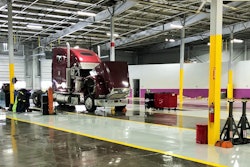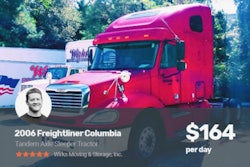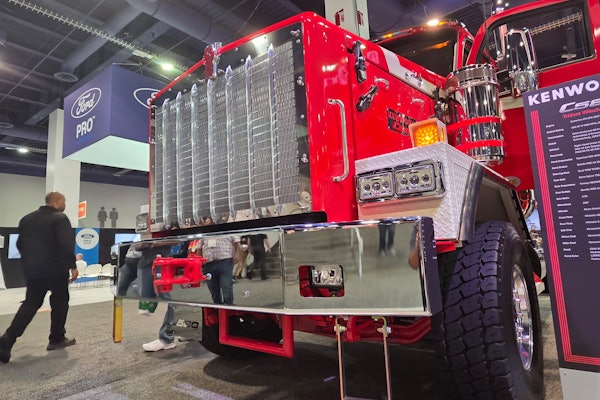Previously in this series: Other expansion challenges: Insurance costs, administrative/compliance burdens, managing customers
Young fleet CEO Marco Ardila didn’t exactly set out to run his family’s small trucking business. Yet that’s where he found himself after the company got overextended after a series of misfortunes during the long expansion of his Uncle’s one-truck business, begun more than 12 years ago.
“I don’t drive trucks,” he says. “My background is as an industrial engineer. I’m just trying to help my family as much as I can.”
The Miami, Fla.-based company, Firstway Logistics Trucking, after aggressively selling some assets to improve its financial position, sits now at 10 trucks and 15 trailers, down from 30 trucks around 2011-12. But the company currently employs only five drivers, says Ardila. Having five trucks and about 10 trailers sitting idle led Ardila to the relatively new COOP by Ryder program. It’s in operation in his area and the Atlanta region, with plans to expand throughout Florida by year-end.
Ardila calls COOP by Ryder a kind of “Airbnb for the trucking business.” While fleets leasing or renting equipment from other fleets is nothing new, online equipment rental marketplaces are. One might not expect to see a new sharing platform come from a company already in the equipment rental and leasing business, as this would only increase the competition. Yet that’s exactly what Ryder — a commercial fleet management, dedicated transportation, and supply chain solutions provider — did by launching COOP first in Atlanta.

The expansion to South Florida early this year brought a new revenue stream to Ardila and company. On Jan. 5, the company began renting assets to carriers through COOP. The first transaction was renting three reefer trailers for three days. This led to a rental contract of five trailers for 20 days. More contracts followed.
Firstway Logistics’ rental revenue is about $128 dollars a day plus $0.12 per mile for trucks. Reefer trailers go for approximately $69 a day plus $1 per hour for run time, he says. “I think COOP is definitely helping to sustain the business” at this point, Ardila says.
 What diversification looks like with growth can take many forms. The Atlas Trucking company, based in Taylor, Mich., today operates with 130 trucks after its founding in the late 1990s by the Eaton Steel manufacturer as a dedicated carrier. The vast majority of those units are controlled by owner-operators leased to the company, and the company also operates an affiliated brokerage that contracts with numerous independents and acts as the steel manufacturer’s principal 3PL. Pictured here is the headquarters of the new Atlas Fleet Services maintenance facility along I-94, built not only to serve the needs of the fleet itself and its owner-operators but anyone needing maintenance along the corridor.
What diversification looks like with growth can take many forms. The Atlas Trucking company, based in Taylor, Mich., today operates with 130 trucks after its founding in the late 1990s by the Eaton Steel manufacturer as a dedicated carrier. The vast majority of those units are controlled by owner-operators leased to the company, and the company also operates an affiliated brokerage that contracts with numerous independents and acts as the steel manufacturer’s principal 3PL. Pictured here is the headquarters of the new Atlas Fleet Services maintenance facility along I-94, built not only to serve the needs of the fleet itself and its owner-operators but anyone needing maintenance along the corridor. Says Marc Scibilia, the fleet’s safety director and much more after being the second driver hired by Atlas, “We’re now fully operational” in the new shop with “73,000 square feet of space – capable of anything from minor repairs” to major work. The new shop is the result of bringing as much maintenance in-house as possible after maintenance safety scores in the CSA SMS were high in the early days of that program. Increased routine inspections and maintenance were “being done out of doors,” presenting issues in inclement weather, of course. With growth continuing, the company leased a small shop just to do routine equipment inspections and quick maintenance jobs, before the current facility became available and open for business. It can fit 17 tractor-trailer combinations under the roof and is fully staffed with techs. Read more about the new facility via this link to prior coverage.
Says Marc Scibilia, the fleet’s safety director and much more after being the second driver hired by Atlas, “We’re now fully operational” in the new shop with “73,000 square feet of space – capable of anything from minor repairs” to major work. The new shop is the result of bringing as much maintenance in-house as possible after maintenance safety scores in the CSA SMS were high in the early days of that program. Increased routine inspections and maintenance were “being done out of doors,” presenting issues in inclement weather, of course. With growth continuing, the company leased a small shop just to do routine equipment inspections and quick maintenance jobs, before the current facility became available and open for business. It can fit 17 tractor-trailer combinations under the roof and is fully staffed with techs. Read more about the new facility via this link to prior coverage.As small fleet owner-operator Daniel Davidson’s 20-truck Davidson Trucking fleet has expanded over decades since he started in the late 1980s, it now has a solid warehousing component to the business that itself started with renting space in three or four storage trailers. Responding to additional demand for space, the company in the late 1990s built a 12,000-square-foot warehouse that “was full before we got it completed,” he says.
In 2000 the company expanded it to the current 52,000-square-foot facility. Davidson rents space in it and utilizes it to help organize less-than-truckload loads. “That’s been a big part of our being able to generate extra revenue – piecing loads together” in the warehouse, Davidson says. –Aaron Huff contributed to this report










